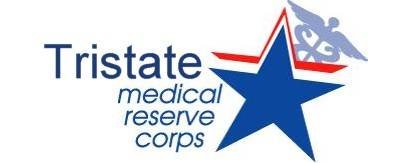|
 Tristate Medical Reserve Corps
Tristate Medical Reserve Corps
Frequently Asked Questions
What is the Tristate Medical Reserve Corps? The Tristate Medical Reserve Corps (TMRC) is a volunteer organization
comprised of citizens from southwest Ohio, Northern Kentucky and southeast
Indiana that organizes and trains medical and non-medical volunteers to assist
during community emergencies.
Who is eligible to volunteer for the TMRC? Any citizen who is 18 years of
age or older may join the TMRC. A wide range of medical professionals such as
physicians, pharmacists, nurses, dentists, mental health providers and others
are needed to provide direct medical services. A large number of non-medical
volunteers are also needed to provide support services from clerical to computer
support to transportation and communications.
What might I be asked to do? Volunteers might be called to assist in
distribution of medication or vaccines at mass distribution sites called Points
of Dispensing (PODS). Volunteers may also be called to staff Alternate Care
Centers (ACC) when all area hospitals have reached their maximum capacity or as
support for addressing minor injuries and the worried well in a mass causality
event. Volunteers may be asked to assist at Family Assistance Centers where
family members wait for news of injured loved ones. Volunteers may even be
called to assist in organizing additional volunteers who respond to help at the
time of an emergency. Volunteers will not be asked to do things that they are
not trained for or comfortable doing. There are tasks for anyone willing to
help.
Where would I be volunteering? Volunteers could be contacted to assist in
their immediate community, their county, the Tristate area or even in another
part of the state or the U.S. Volunteers have the right to determine where and
when they are able to assist. For medical personnel employed by hospitals, your
first commitment is to your hospital. The TMRC understands that some volunteers
have commitments that will only allow them to serve in their immediate
communities. Others have more flexibility and are willing to be deployed across
the country. Volunteering for the TMRC does not commit a volunteer to respond to
any specific emergency.
If I volunteer, what is the time commitment? A very basic level of
training is required for each TMRC volunteer. Additional training is offered but
is completely voluntary. Day-long opportunities to practice emergency skills
through exercises with public health, law enforcement and other emergency
responders will be available to TMRC volunteers. Volunteers may steer their
pre-emergency involvement based on their availability and interest. Of course,
each emergency will have different demands of the TMRC volunteers. National
emergencies may require a several week commitment. Local emergencies may simply
require a commitment of a few hours or a few days.
How would I be notified if the TMRC were to be activated? Once you
volunteer your name will be entered into a TMRC database. If an event requires
the call-out of the TMRC volunteers, you will receive notification informing you
of the incident and requesting your assistance. If you are able to respond, you
will be asked to go to a centralized staging location for detailed information
and deployment instructions. You will never be sent into an unsafe area.
What if I am a member of a hospital staff or a volunteer for the Red Cross?
In the time of a major medical or public health emergency hospitals will need
their staff and it is understood that some volunteers may not be available for
the TMRC response. Red Cross volunteers will likely be needed for all large
scale emergencies and Red Cross volunteers should maintain their allegiance to
the Red Cross. The TMRC is about organizing a medical response from the many
professionals and non-professionals who are willing to help but never at the
expense of our critical hospital or Red Cross partners.
What are the benefits of volunteering for the TMRC? Volunteers play a
critical role in ensuring a rapid and full response to a public health
emergency. By volunteering for the TMRC, you will be prepared to make sure your
community is as prepared as possible for responding to a large scale event. Your
actions may help save lives or prevent illness in your neighbors and loved ones.
Volunteers gain personal satisfaction from knowing that they�re helping their
community be prepared. Many people want to help during a crisis but organizing
and training volunteers after the crisis has occurred is difficult and
ineffective. By volunteering prior to an emergency, you will be trained and
provided credentials that allow you to be quickly and effectively deployed.
What training is required? A very basic level of training is required for
each TMRC volunteer. Attendance at a 2-hour introduction course and a 2-to
3-hour independent learning program on the National Incident Management System
are all that is needed to join. Many additional training opportunities are
available for those who wish to have more in-depth knowledge and perhaps a
higher level of responsibility should they be deployed. These trainings range in
length from 2 hours to day long events. Some self-paced learning opportunities
are even available online. Volunteers are encouraged to attend as much training
as they would like, but the amount of time they invest beyond the basic level is
up to each volunteer.
To become a registered volunteer with the Tristate Medical Reserve Corps visit
www.serveohio.org. You may also
send questions or concerns: mrc@gchc.org or
call (513) 531-0267.
If you are having trouble registering as a
volunteer on the Serve Ohio website
click here to download the volunteer registration form. If you
would like to speak with a representative from the Clermont County General
Health District please
contact us.

